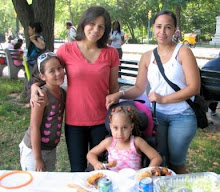Tuesday, November 29, 2011
Learning to Use the Internet as an Advocacy Tool
On Thursday November 17, 2011 the Metropolitan Parent Center (MPC) conducted a workshop entitled, “Internet 101: Learning to Use the World Wide Web. Presenter Mike Mitchell, Deputy Executive Director of Sinergia with the assistance of Godfrey Rivera, Co-Director of the MPC, taught parents the fundamentals of working with the Internet and how to use it as an advocacy tool. They also learned how it can be used to get informed about issues such as how their children’s disabilities affect their learning in school.
Participants also learned about e-mail communication, and how to search topics by using “web browsers.” Parents were given hands-on opportunities to practice using a number of laptops that were set up for their use. They followed instructions by viewing on a large screen while Mr. Mitchell provided easy-to-understand instructions on how to navigate the Internet. The workshop was also available to the Spanish-speaking parents via the use of simultaneous interpretation. In addition, a list of disability-related Internet resources was provided to them, which you can find below.
Disability-Specific Sites
1. http://www.add.org/
This site provides information, resources and networking opportunities to help adults with Attention Deficit/Hyperactivity Disorder (ADHD) by bringing together science and the human experience for both adults with ADHD and professionals who serve them.
2. http://www.autismconcepts.com/
This site shares information from a variety of sources and provides many links to other sites regarding practical ways to help, plan and manage the lives of children with autism. Information with respect to any treatment, therapy, program, service or provider herein is intended for information and educational purposes only.
3. http://www.autism.org/
The Center for the Study of Autism provides information about autism to parents and professionals, and conducts research on the efficacy of various therapeutic interventions for children with autism.
Behavior
4. Behavior Disorders
http://www.behaviordisorder.org/
This website for teens, adults and parents offers information on behavior disorders, conduct disorders, and other behavior problems. Their articles are written to educate the general public about behavior disorders, the warning signs, treatment, and statistics on behavior issues.
5. Behavioral Disorders in Early Childhood
http://www.brighttots.com/Behavioral_disorders.html
This website discusses factors such as the environmental and genetic influences that may contribute to challenging behaviors in young children. There is also information on treatments and interventions for children with behavioral disorders.
6. Center on the Social and Emotional Foundations for Early Learning
http://csefel.vanderbilt.edu/about.html
The Center on the Social and Emotional Foundations for Early Learning is project designed to strengthen the capacity of Head Start and child care programs to improve the social and emotional outcomes of young children.
7. Conduct Disorders-Support for Parents
http://www.conductdisorders.com/
This is a website written by parents who are raising children with many different diagnoses regarding conduct disorders, and who demonstrate oppositional behaviors and are resistant to parenting.
Learning Disabilities
8. www.chadd.org
Children and Adults with Attention Deficit Disorders (CAADD.) This organization advocates for students with ADHD and coexisting disorders.
9. www.interdys.org
The International Dyslexia Association is the oldest of the organizations that are specifically concerned with learning disabilities. Both a medical and an educational emphasis are maintained in this organization
10. Learning Disability Resources
http://www.as.wvu.edu/~scidis/ldinfo.html
This website is a directory with links to other websites with information and resources pertaining to learning disabilities.
11. National Center on Learning Disabilities
http://www.ncld.org/
The National Center for Learning Disabilities works to ensure that the nation's 15 million children, adolescents and adults with learning disabilities have every opportunity to succeed in school, work, and life.
12. http://www.ucp.org/
United Cerebral Palsy (UCP) is the leading source of information on cerebral palsy and is an advocate for the rights of persons with any disability. As one of the largest health charities in America, the UCP's mission is to advance the independence, productivity and full citizenship of people with disabilities through an affiliate network.
(Photo)
Sunday, November 6, 2011
Bullying Prevention Forum Recap
Bullying among students with disabilities was the main topic at a forum held last month at Sinergia, who was designated as a champion partner in Pacer's National Bullying Prevention Program. "What we did was unique because we had parents and students participating in separate activities that addressed bullying simultaneously," explains Cassandra Archie, co-director of Sinergia's Metropilitan Parent Center.
The afternoon kicked off with a skit performed by Day Hab Program participants. "Armando, Terri, Trish, Emmanuel, and Vanessa practiced their lines for a full week before the event on the 19th," said Day Habilitation Art Specialist Erin McSorley. "They depicted a scene on a bus where an individual is targeted by a bully, but is encouraged by her friend's words and stands up to the bully. The actors really enjoyed being involved with the event and also had the opportunity to practice what to do if faced with a real bully," she added. The performers in the skit were all young adults, highlighting the fact that bullying and harassment can occur to older people as well.
After that there was a "speak out" for parents, to give them information and resources, while at the same time, the children gathered in the art studio to paint an anti-bullying banner, also organized by Erin.
Finally, everyone came together and the children talked about their experiences with bullying. Parents shared stories and one described how their child didn't want them to come to their school, and instead wanted to work it out themselves. The parent's immediate response was "I'm going to the school," and the child was against that because it would be embarrassing. In the end they called and spoke to the principal.
Another parent talked about her daughter who was bullied not only in school but also in her own neighborhood, so it spilled out onto the community. They contacted the parent of the bully and had a discussion. It worked out so well that now the (former) bully and the woman's daughter get along and there's no more harassment. We'd like to thank our wonderful sponsors for making this event possible: Dunkin Donuts, Subway, McDonald's (Lexington Ave.), Quality Natural Food Restaurant, Affinity Health Plan, the Franciscan Friars of the Renewal, Fabco Shoes and Pathmark supermarkets.
Visit Sinergia's Facebook page to view the pictures from the event.
Resources
"Respect For All" is NYC Chancellor's piece on anti bullying. It has a poster and brochure available with answers to:
- What happens to bullies?
- What is considered harassment?
- What are some examples of banned behavior?
- What should students do if they are being bullied?
Hotline for students who are experiencing bullying. This service is a result of a collaboration between the teacher's union (UFT) and the NYC Mental Health Association. It will be staffed from 2:30 p.m. to 9:30 p.m., Monday through Friday,
by professionals from the Mental Health Association of New York City.
Students can call for services in English, Spanish, Mandarin, Cantonese
and other languages, translated immediately.
Hotline: 212-709-3222
NYS OPWDD Statewide Plan 2011-2015
The Office of People with Developmental Disabilities (OPWDD) has posted their new State Comprehensive Plan, which will completely change the way services are funded and delivered under the 1115 Research and Demonstration Waiver, called the People First Waiver. All Medicaid services and supports for persons with developmental disabilities will ultimately be funded and managed through the new waiver agreement between New York State and the Centers for Medicare and Medicaid Services (CMS). Once the 1115 waiver is approved by CMS, the planning and testing of project pilots as well as the transition will take place over the next five to ten years.
The new system will incorporate key features:
Services will be financed and paid differently, and care management will be the responsibility of not for profit managed care organizations authorized by OPWDD, known as Developmental Disabilities Individual Support and Care Coordination Organizations (DISCOs). All Medicaid services would be included in the waiver; both long term developmental disabilities services and medical services. They will perform at least two primary roles: a) care coordination and b) fiscal intermediation, providing services directly to individuals and/or contracts with a group of providers. As fiscal intermediary, the DISCOs will receive a monthly capitation payment to fund all Medicaid covered services and coordinate non-Medicaid services in an individual’s service plan.
The Statewide Comprehensive Plan is a 90-page document which you can find here: 507 Plan. It is important that people read and review it thoroughly.
The 1115 waiver is the lynchpin of the State Plan, so it is crucial for the future of persons with developmental disabilities and their families. The system is at a crossroads, and we are encouraging parents to testify at upcoming hearings on November 9. Go to Public Hearing for full details.
This is a time of transformation in the service system, so we urge you to participate in the various initiatives pertaining to the 1115 People First Waiver and other events as the planning phase progresses during the year.
The new system will incorporate key features:
- Informed care coordination for people with complex medical and behavioral needs.
- Transformed long term care based on person-centered planning, individual responsibility and self-determination.
- New reimbursement models for institutional and community based care systems.
- An expanded range of community-based services to allow individuals in institutional settings to transition into the community.
- Redesigned assessment tools and eligibility processes.
- Improved health and safety outcomes through a transferred quality management system.
Services will be financed and paid differently, and care management will be the responsibility of not for profit managed care organizations authorized by OPWDD, known as Developmental Disabilities Individual Support and Care Coordination Organizations (DISCOs). All Medicaid services would be included in the waiver; both long term developmental disabilities services and medical services. They will perform at least two primary roles: a) care coordination and b) fiscal intermediation, providing services directly to individuals and/or contracts with a group of providers. As fiscal intermediary, the DISCOs will receive a monthly capitation payment to fund all Medicaid covered services and coordinate non-Medicaid services in an individual’s service plan.
The Statewide Comprehensive Plan is a 90-page document which you can find here: 507 Plan. It is important that people read and review it thoroughly.
The 1115 waiver is the lynchpin of the State Plan, so it is crucial for the future of persons with developmental disabilities and their families. The system is at a crossroads, and we are encouraging parents to testify at upcoming hearings on November 9. Go to Public Hearing for full details.
This is a time of transformation in the service system, so we urge you to participate in the various initiatives pertaining to the 1115 People First Waiver and other events as the planning phase progresses during the year.
Insurance Coverage of Autism Therapies Is Expanded
On Nov. 1st Gov. Andrew Cuomo signed Assembly Bill 8512 into law, one of the most comprehensive autism insurance reform measures in the nation. The new law requires insurance companies to provide coverage of critical autism therapies, including applied behavior analysis (ABA) for both children and adults, and makes New York the 29th state to enact autism insurance reform. The law will take effect in 12 months, on Nov. 1, 2012, and allow up to $45,000 a year in ABA treatments with no limits on age or number of visits. For full details on the new law click here. (Photo)
Subscribe to:
Comments (Atom)













